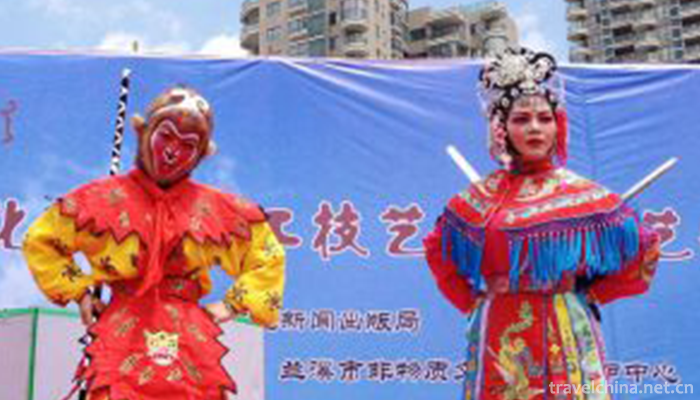Suzhou opera
Spring spread (Hangzhou Spring spread, Shaoxing Spring spread), which originated in the mid-Qing Dynasty, belongs to the category of songs.
On June 7, 2008, Hangzhou and Shaoxing City of Zhejiang Province jointly declared "Spring Spring Spring Spring Packing" which was approved by the State Council to be included in the second batch of national intangible cultural heritage list.
historical origin
Local operas were popular in Jiangsu and Zhejiang in Qing Dynasty. Rising in the Qianlong period, it was called Tanhuangdiao, which was originally a sitting and singing form of endorsement. After Daoguang, Kunqu Opera declined gradually and Tanhuang began to transplant Kunqu Folk Opera in sitting form, which was included in Baiqiu. Each fold was divided into four or five sections. Following the Kunqu Opera, it used a simple and complicated voice, singing loud songs like drums, euphemistically like ballads, and dragging tones like Kunqu Opera. It was a popular singing method of Kunqu Opera, known as Qiantan. Another folk song minor singing, with funny repertoire, known as Houtan.
By the end of the Qing Dynasty and the beginning of the Republic of China, small operas had flourished, and Tanhuang in various places had followed the traditional opera form and put on stage in make-up. With the increase of roles and the need of performance, tunes and music have gradually evolved, forming various local operas of Tanhuang Opera System, such as Su Opera, Yong Opera, Xiju Opera, Shanghai Opera, etc.
artistic characteristics
artistic form
Its basic artistic features are singing, talking and singing, and mainly sitting and singing opera with a prominent voice. Traditional repertoire usually consists of five to seven actors, who play the roles of Sheng Sheng, Dan, Jing and Ugly. They play three strings, pipa, Huqin and other instruments, and sing by themselves. One person plays one or more corners and uses simulated expressions and actions to depict characters and narrate stories. "Zhejiang intangible cultural heritage representative works series: Hangzhou Spring Spring" is one of the series of Zhejiang Intangible Cultural Heritage Representative works. It introduces in detail the historical origin, development status, inheritance context and development prospects of Hangzhou Spring Spring Spring Spring as a local folk art.
Epidemic areas
Spring springs are beach springs. A folk art popular in Suzhou, Shanghai, Hangzhou and Ningbo. The stall leads to the beach. Li Dou of the Qing Dynasty wrote "Records of Yangzhou Paintings by Hongqiao": "The first priority is the solo singing, followed by the ten drums, such as gongs and drums, instant collision, ditties, springs, dialogue and commentary, all of which are of great help." See Beach Spring.
Schools
Haining School, commonly known as "Haining Spring Spring Spring". Haining Spring Spring Shopping is a kind of folk music with short and concise form, lively singing and popular among the masses.
Haining Tan-huang is a self-taught and self-singing style of music performance with dialectal slang, band accompaniment and the role of general band performers and singers. The traditional music cards of Haining Spring Shop are "Dongxiang Diao" and "Appreciating Palace Flowers". The traditional songs include "Jade Dragonfly", "Little Nun Down Mountain", "The Story of the Western Chamber" and "Selling Grass and Rattan". Haining Spring Shop is often performed in the ceremony of family wedding, birthday celebration, house building, silkworm rearing, fertility and other traditional festivals, temple fairs and other folk activities. These ceremonies and activities often invite theatres, choirs, Taoist societies, shadow plays and Sao Zi Shu to sing. While performing the original play, Haining Tan-huang has the function of gathering excitement and adjusting the atmosphere along with the interluding of the main events.
As a traditional folk art, Haining Spring Shop absorbs and improves Shanghai Spring Shop, which is widely spread in Dingqiao and Qingyun of Haining. At present, in Dingqiao Town's choir or Taoist team's singing, still interspersed with the singing of Haining Spring, and injected new era content into the singing.
Inheritance Significance
Spring-spreading reflects the entertainment and cultural elements of the masses in a specific era, and has a high value in the study of folk art.

0 Questions
Ask a Question
Your email address will not be published.